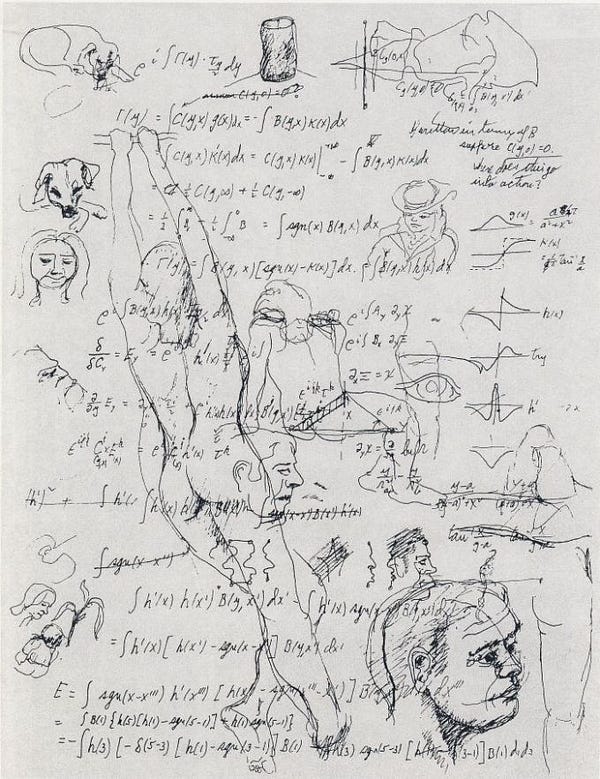
Surely You're Joking, Mr. Feynman!
| Ⓒ By Jonathan Roseland |
This book is praised highly in Tools of Titans so I decided to pick it up on Kindle. I found it both charming and enlightening about science.
Richard Feynman was a science and mathematics prodigy and one of the great physicists of the 20th century. He worked on the atomic bomb as part of the Manhattan Project and as a professor at Caltech and Cornell. He was a true polymath who had a bit of an anti-establishmentarian streak and was a contrarian thinker.
Working for the military
He began working for the US Army during World War Two, first, he worked on a mechanical computer for directing artillery. (p. 101) Then he went on to work at Los Alamos where they developed the atomic bomb. He describes the first nuclear test detonation
He describes the first nuclear test detonation
Time comes , and this tremendous flash out there is so bright that I duck , and I see this purple splotch on the floor of the truck . I said , “ That’s not it . That’s an after - image . ” So I look back up , and I see this white light changing into yellow and then into orange . Clouds form and disappear again — from the compression and expansion of the shock wave .
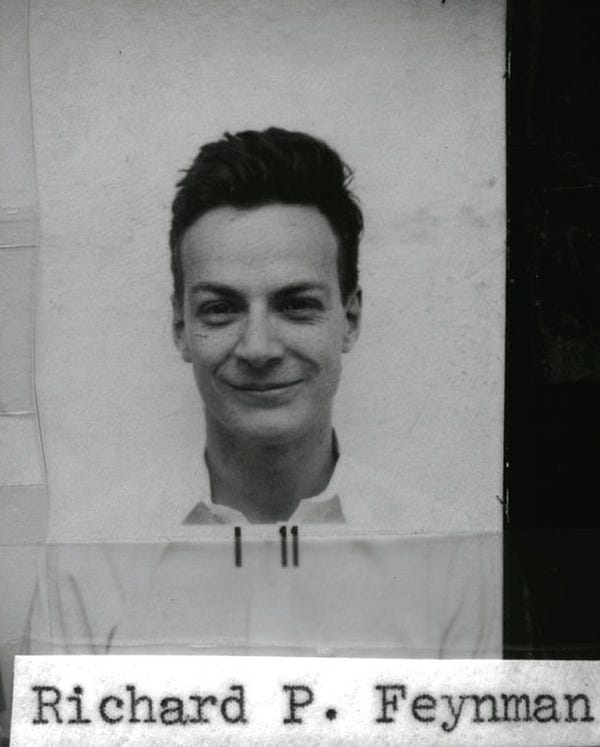 Apparently, he just could not contain his curiosity and he looked at the first blast without the eye protection that everyone was ordered to wear
Apparently, he just could not contain his curiosity and he looked at the first blast without the eye protection that everyone was ordered to wear
I’m probably the only guy who saw it with the human eye.
(p. 134)
As one of the scientists responsible for developing the atomic bomb, I think he's one of the few people actually qualified to do some moralizing on the topic of using nuclear weapons in war. But this topic is not broached.
I've heard multiple perspectives on this debate; two of my favorite historical thinkers, Stefan Molyneux and Dan Carlin, have opposing viewpoints on the US usage of nuclear weapons at the end of WW2. I haven't made up my mind yet on it and Richard Feynman hasn't helped me.
On management strategy
Those familiar with the Manhattan Project will remember that, amazingly, over 600,000 souls worked on it while only a very elite few knew that they were creating a bomb powerful enough to destroy a city.
Oppenheimer went and talked to the security and got special permission so I could give a nice lecture about what we were doing , and they were all excited : “ We’re fighting a war ! We see what it is ! ” They knew what the numbers meant . If the pressure came out higher , that meant there was more energy released , and so on and so on . They knew what they were doing . Complete transformation ! They began to invent ways of doing it better .
(p. 128)
People don't need to know the exact specifics of why they are doing something but if they are given a moral mission like winning a war they will be imbued with great genius and motivation.
At MIT
In college, he worked with Cyclotron machines.
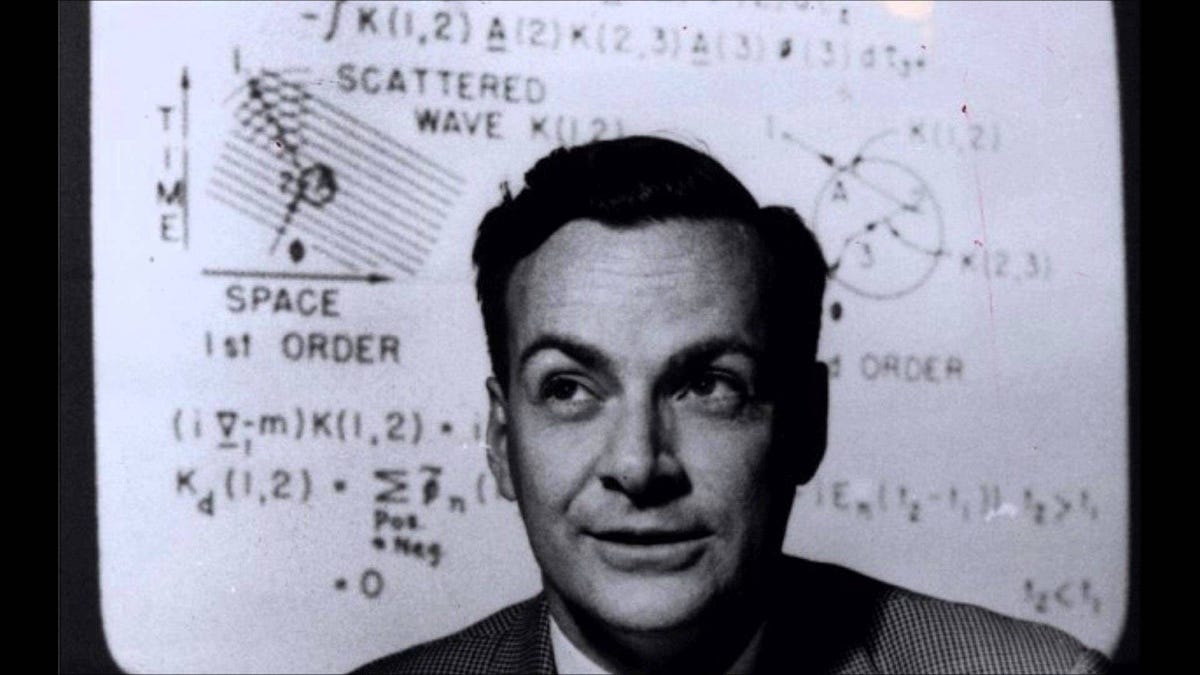
On phages
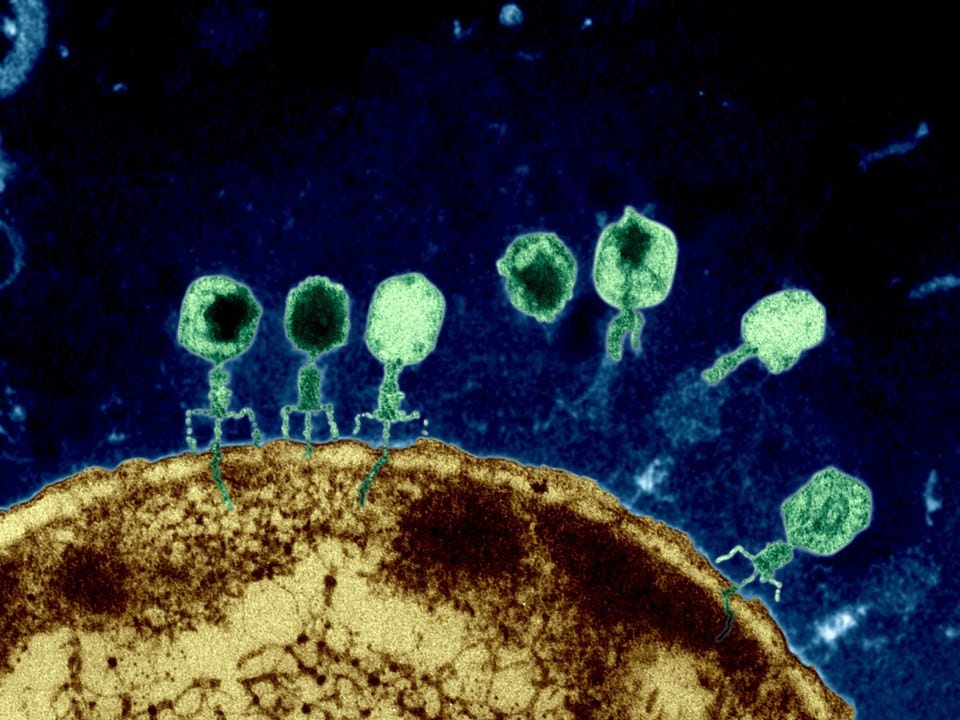
a phage is a virus that contains DNA and attacks bacteria
(p. 73)
Is there a way to do gene editing with phages? I want my CRISPR Gattaca baby!
On sleep
He has some interesting insights on sleep and the nature of consciousness
I also noticed that as you go to sleep the ideas continue , but they become less and less logically interconnected .
(p. 48)
Yes, as we slip into unconsciousness I think we start being overwhelmed by the informational depths of our minds.
Feynman also experienced lucid dreaming...
When you’re dreaming , this interpretation department is still operating , but it’s all slopped up . It’s telling you that you’re seeing a human hair in the greatest detail , when it isn’t true . It’s interpreting the random junk entering the brain as a clear image .
(p. 51)
Recently I was contemplating how dreams are likely an interpretation of an excess of information. Researchers have hypothesized that dreams are a threat simulation built into our evolutionary psychology which would be why so many of our dreams consist of dangerous situations;
- Being chased through a dark alley.
- A car crashing on the highway.
- Falling off a building, etc.
Yet dreams are far from being an ideal threat simulation - more or less...
- A third of the time they are dangerous.
- A third of the time they are just nonsensical conversations with old acquaintances.
- A third of the time they are just sex with three-boobed women (or whatever tickles your fancy).
And why do we forget them so soon after having them?
Surely billions of years of evolving psychology could have produced a more cogent threat simulation mechanism.
I think dreams must at the least be something more than just a threat simulation; I think they are also an interpretation of the huge amounts of raw data that our minds process as we sleep.
Dreaming is clearly a manifestation of consciousness since indeed we are conscious of ourselves, our bodies, our past, our feelings, our friends, and our families in our dreams. The consensus of neuroscientists seems to be that consciousness is a filter of the immense amounts of information competing for our cognitive attention.
In a fascinating interview that Edward Snowden gave, he hypothesized something really interesting about extraterrestrial aliens...
If we were to receive some kind of radio signal from aliens it would likely be totally unrecognizable because the encoding mechanism of the aliens would be so much more advanced than ours, the density of information would render it indecipherable static to us.
So it makes quite a bit of sense that dreams are just a pattern in the static.
We all know that our dreams often have a lot to do with what happened that day and we also know that sleep quality affects how well our short-term gets processed into our long-term memory. I'd love to see a dreaming study done to see if there's a correlation between the quality of sleep and themes from that day's events showing up in the dream.
On seducing women
 Richard Feynman loved the ladies and wrote humorously about his adventures and misadventures chasing skirts. A pickup mentor tells him
Richard Feynman loved the ladies and wrote humorously about his adventures and misadventures chasing skirts. A pickup mentor tells him
under no circumstances be a gentleman! You must disrespect the girls. (p. 188)
Some things don't change...
I built up my psychology differently : I adopted the attitude that those bar girls are all bitches , that they aren’t worth anything , and all they’re in there for is to get you to buy them a drink , and they’re not going to give you a goddamn thing ; I’m not going to be a gentleman to such worthless bitches...
(pp. 188-189)
Although he ended up being married twice. I suspect that if Richard Feynman had been born about 50 years later he would have been a committed pickup artist.
On Brazil
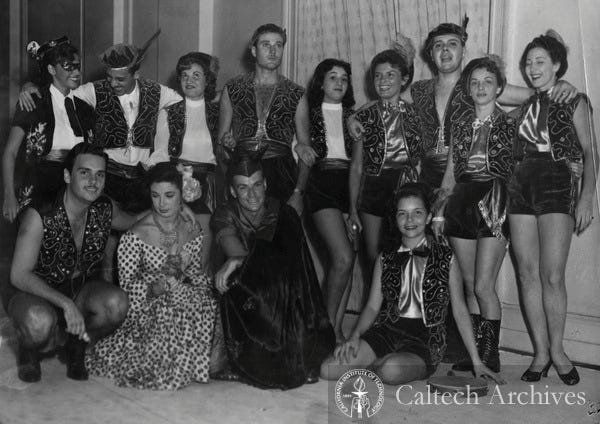 Like myself, he was seduced by and emerged himself in the vibrant culture of a South American country.
Like myself, he was seduced by and emerged himself in the vibrant culture of a South American country.
Because I liked it so much that first time in Brazil, I went again a year later, this time for ten months. (p. 204)
I think I told him that when I had been in Brazil the first time, I had heard a samba band practicing in the street, and I wanted to learn more about Brazilian music. (p. 205)
He also lived in Rio de Janeiro near Avenida Atlantica.
As an artist
Later in his life, he developed an artistic streak drawing...
And making music - he even joined a samba band in Brazil. Although he definitely did not hold all artists in high esteem...
The artists were very interesting people . Some of them were absolute fakes : they would claim to be an artist , and everybody agreed they were an artist , but when you’d sit and talk to them , they’d make no sense whatsoever! (p. 277)
As an antiestablishmentarian
Throughout the book, he has got quite a bit of criticism for how establishments corrupt science. His solution to the significant problem of bad science is being a contrarian thinker and above all a practitioner. I read this book while reading Antifragile by Nassim Taleb which echos a lot of the same sentiments that the antidote to bad theories that do science and society harm is practitioners, doers, who are willing to speak up, buck the trend, and push back against theorists.
The trouble with theorists is, they never pay attention to the experiments! (p. 253)
He draws the comparison in the book between witch doctors and theorists, that for thousands of years people believed that witch doctors doing a ritual or incantation could heal serious medical problems. Now we know that these things really don't work yet they fooled everyone for thousands of years. Even now in many parts of the world, people still go to witch doctors and pay them good money to do nothing. This reveals a real weakness in human psychology; we are willing to believe complete nonsense when presented with a theory that appeals to our confirmation bias. The witch doctors had elaborate metaphysical theories about why their healing worked and thanks to a combination of confirmation bias, the placebo effect, and probably some herbal medicine that actually worked people believed them and got better.
Currently, I'm reading this excellent historical fiction series about the Spanish conquistadors conquering Mexico, it has these amazingly morbid descriptions of the native people of Mexico sacrificing tens of thousands of people in their human sacrifices to their gods. Cutting the hearts out of teenage virgin girls on altars on the flat peaks of their pyramids - pretty grisly stuff! It got me thinking...
How the hell were normal people convinced that it was OK to do thousands and thousands of bloody human sacrifices every year?
The royalty and high priests told the masses that these sacrifices ensured successful military campaigns, fertility, good weather, a prosperous harvest, or whatever. When good fortune followed a great bloody week of sacrifices the people figured it must be because their war god was happy and if bad luck ensued, well that must be because they had not sacrificed enough victims to their god. Well, that's the power of theory plus entropy. In a sufficiently chaotic environment, people will believe the most unreal bullshit to make sense of things. Human beings have a lot of trouble accepting randomness, we desire causality above all.
Luckily we don't have human sacrifices anymore but Feynman makes the point that often scientists act as the new high priests of society. The new purveyors of our incessant demand for theories to explain everything and a lot of times they are wrong.
There are big schools of reading methods and mathematics methods, and so forth, but if you notice, you’ll see the reading scores keep going down—or hardly going up—in spite of the fact that we continually use these same people to improve the methods. There’s a witch doctor remedy that doesn’t work. It ought to be looked into; how do they know that their method should work? Another example is how to treat criminals. We obviously have made no progress—lots of theory, but no progress—in decreasing the amount of crime by the method that we use to handle criminals. Yet these things are said to be scientific.
(p. 340)So we really ought to look into theories that don’t work, and science that isn’t science. I think the educational and psychological studies I mentioned are examples of what I would like to call cargo cult science. (p. 340)
On scientific integrity
a principle of scientific thought that corresponds to a kind of utter honesty—a kind of leaning over backwards. For example, if you’re doing an experiment, you should report everything that you think might make it invalid—not only what you think is right about it: other causes that could possibly explain your results; and things you thought of that you’ve eliminated by some other experiment, and how they worked—to make sure the other fellow can tell they have been eliminated. Details that could throw doubt on your interpretation must be given, if you know them. You must do the best you can—if you know anything at all wrong, or possibly wrong—to explain it. If you make a theory, for example, and advertise it, or put it out, then you must also put down all the facts that disagree with it, as well as those that agree with it.
(p. 341)In summary, the idea is to try to give all of the information to help others to judge the value of your contribution; not just the information that leads to judgment in one particular direction or another.
(p. 341)
On plotting data
it depended on one or two points at the very edge of the range of the data , and there’s a principle that a point on the edge of the range of the data — the last point — isn’t very good , because if it was , they’d have another point further along
(p. 254)
You don't want to judge a body of data by its extremist points; hey that's good advice for life in general!
On fake education
He describes how at the Universities in Brazil he discovered a fundamental error in the education system. That students were excellent at regurgitating facts, theories, and formulas about mathematics and physics but they could not for the life of them apply that information in practice. They were just memorizing information.
He thought this was a major issue so he addressed his students and the professors there and identified this issue of the fake education that the pupils were receiving. He writes that they soberly accepted his criticism and pondered ways to improve, I can just imagine if you did that now at a university, if you criticized both the students and teachers, it would probably be an outrage, they would run you out of there and probably call you a racist.
He also describes how students refused to ask questions because they all wanted to appear to understand the topic perfectly.
I explained how useful it was to work together , to discuss the questions , to talk it over , but they wouldn’t do that either , because they would be losing face if they had to ask someone else . It was pitiful ! All the work they did , intelligent people , but they got themselves into this funny state of mind , this strange kind of self - propagating “ education ” which is meaningless , utterly meaningless !
(p. 215)
On government inefficiency
He related a funny story where he agreed to do a talk about science at a local city college for their students for $50 on the condition that he would only have to sign his name 13 times. No more! For all the city bureaucracy he does have to sign his signature 13 times, so he tells them that on principle he's going to refuse to accept the check and the city employee responds that he must accept the check.
Finally , it got straightened out . It took a long time , and it was very complicated — but I used the thirteenth signature to cash my check .
(p. 257)
On equality
He has some real insights on the issue of social equality that is still so hotly debated.
I wrote out carefully, as best I could , what I thought the subject of “ the ethics of equality in education ” might be , and I gave some examples of the kinds of problems I thought we might be talking about . For instance , in education , you increase differences . If someone’s good at something , you try to develop his ability , which results in differences , or inequalities .
So if education increases inequality, is this ethical?
Then, after giving some more examples , I went on to say that while “ the fragmentation of knowledge ” is a difficulty because the complexity of the world makes it hard to learn things, in light of my definition of the realm of the subject , I couldn’t see how the fragmentation of knowledge had anything to with anything approximating what the ethics of equality in education might more or less be. (p. 281)
The fragmentation of knowledge is this phrase they use to describe how in every field there's this incredible long tail of knowledge and expertise. 500 years ago in a town, you would have a doctor, a lawyer, a metalsmith, and a farmer. That doctor could do everything from treating an illness to delivering a baby. Now we have hundreds of different kinds of doctors. We have domains of expertise within domains of expertise. These proto-social justice warriors that he was hanging out with were saying that this fragmentation of knowledge makes us less equal which is bad somehow. If that makes zero sense to you, well it also made zero sense to Richard Feynman.
On socialism
a very nice , very Jewish man gave a speech . It was a good speech , and he was a very good speaker , so while it sounds crazy now , when I’m telling about it , at that time his main idea sounded completely obvious and true . He talked about the big differences in the welfare of various countries , which cause jealousy , which leads to conflict , and now that we have atomic weapons , any war and we’re doomed , so therefore the right way out is to strive for peace by making sure there are no great differences from place to place , and since we have so much in the United States , we should give up nearly everything to the other countries until we’re all even .
(p. 282)
We are all beneficiaries of inequality; we all live lives of almost total comfort and security with privileges that would make a king from 500 years ago jealous and our lives are so good thanks to inequality.
- We live in the most compassionate, peaceful, and rational world yet because great men imposed good ideas upon society.
- Without the inequality of intelligence, we would be bereft of all the extraordinary advances in medicine that have vanquished so much suffering from the world made (mostly) by smart guys with IQs over 120.
- With inequality, we get constructive competition between firms seeking to provide us with a smarter phone, a safer car, or a more comfortable bed.
- It is wealth inequality that allows for the research and development of fantastic new technologies and products.
- The vast, boundless number of entertainment and lifestyle options that we have are thanks to inequality and differences in taste, curiosity, and culture.
- The most inspiring art is a result of artists striving for something or expressing their individuality, not their normality. If all artists were equal how boring would their art be?
Equality is essential to civilization as a legal concept but it is a terrible value to be elevated and pursued for its own sake. Indeed, it is the ultimate anti-value.
Equality is the enemy of greatness and the parent of mediocrity and suffering. Equality promises paradise but delivers dystopia.
Everything that makes the world interesting or life good is a product of inequality.
I recommend you read this book if you're interested in science and critical thinking.
Resources
- Book
- eBook (Kindle/ePub/PDF)
Editor review
User reviews
-
{{#owner}}
-
{{#url}}
{{#avatarSrc}}
{{name}} {{/url}} {{^url}} {{#avatar}} {{& avatar}} {{/avatar}} {{name}} {{/url}} - {{/owner}} {{#created}}
- {{created}} {{/created}}


